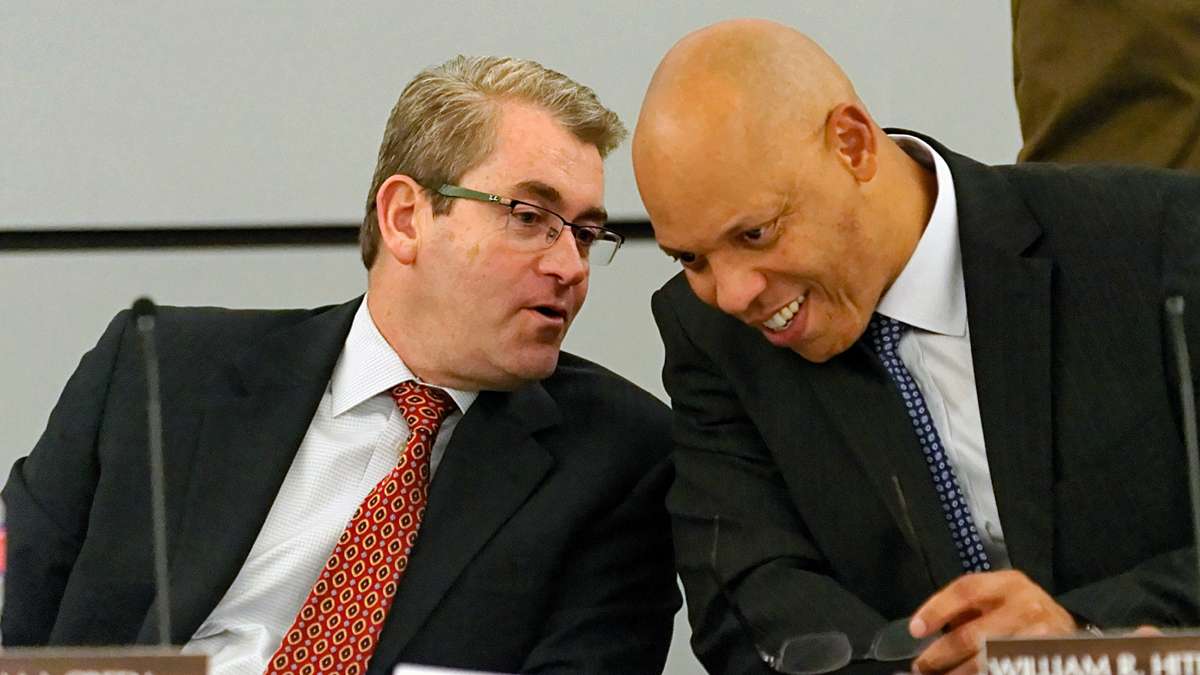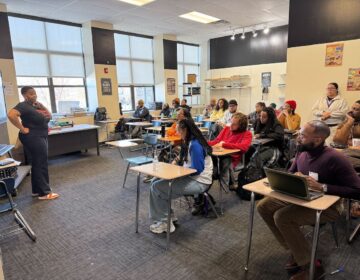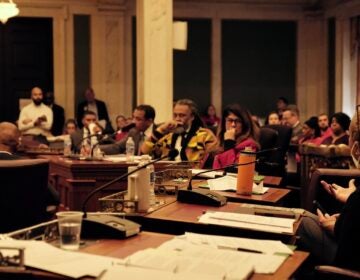SRC’s Green: Next Philly teachers contract will include longer school day

Philadelphia School Reform Commission Chairman Bill Green and Superintendent William Hite chat at an Oct. 17 SRC meeting. (Bas Slabbers/for NewsWorks)
Philadelphia School Reform Commission Chairman Bill Green says the district’s next contract with the teachers union will include a longer school day.
“Longer school days and longer school years are some of the things that are going to make improvements in high-poverty urban districts,” said Green in a telephone interview Wednesday.
Green said state law mandates that the Philadelphia School District extend its teachers contracted workday.
On Oct. 4, the School Reform Commission unilaterally terminated the Philadelphia Federation of Teachers union contract in a move that’s now under review by the Pennsylvania Commonwealth Court.
That contract called for a seven-hour, four-minute school day for teachers, Green said.
Pennsylvania law requires Philadelphia teachers to have a work day no less than the state average, which the Department of Education said is currently seven hours and 30 minutes.
“The district has just never enforced that provision of state law,” said Green. “We have no choice but to follow state law … so any new contract with teachers will have to be seven hours and 30 minutes.”
“State law is state law, and the fact that previous School Reform Commissions did not follow it does not mean that I won’t,” he continued.
Green said the changes would likely occur without increasing teacher salaries.
“Every other district that’s gotten the concessions along the lines we’re looking for has paid for them,” he said. “We don’t have the capacity to do that, but we still have to improve children’s education.”
PFT president Jerry Jordan said he was “stunned” by Green’s “continued lack of respect for educators.”
“To expect that the district is going to be able to attract and retain teachers as long as they totally disrespect them as professionals is unconscionable,” Jordan said. “It’s not going to happen.”
Green’s announcement comes days after union leaders in Boston came to an agreement with the school district there to add 40 minutes to the school day for elementary and middle schools.
In Boston, the extra 40 minutes per day – which will add the equivalent of a month of instruction – will provide teachers with an additional stipend of $4,464.
Once fully implemented, the plan in Boston will cost an extra $12.5 million per year. If the same plan were implemented in Philadelphia, it would cost much more, as the district has more than double the number of Boston’s students.
Philadelphia School District officials say they need $30 million in additional revenues next year merely to be able to continue providing the “insufficient” status quo, in which resources districtwide have been stripped to bare-bones levels.
At loggerheads
The PFT contract expired at the end of August 2013.
Jordan said Green’s rhetoric was “very, very much the antithesis of what was reached in Boston, where there was clearly collaboration between the mayor, the superintendent and the union.”
Green stressed the need to provide students with more time for tutoring and remediation despite funding shortfalls.
“There is not the time in the day … for each child who’s falling behind in one area or another,” he said. “And that is what successful schools, both public and charter, use the extra time for.”
Green said the Philadelphia school district has, on average, the third-highest-compensated teachers in the state.
“People are going to quibble with that,” he said. “But that’s the data the district gave me.”
Jordan said that math made no sense.
“He’s absolutely wrong. You can’t compare Philadelphia with Podunk,” said Jordan, who said Philly teachers are paid 20 percent less than surrounding suburban districts.
Neither Green nor Jordan would comment about how the looming Commonwealth Court decision could affect Green’s plan.
Time spent wisely?
Supporters of a longer school day include President Barack Obama, who has said the current school calendar was created in agrarian times when students were needed back on the farm in time to plow fields before dark.
Jennifer Davis, president of the National Center on Time and Learning, said the benefits of added time are numerous.
“More academic supports for students, more planning and collaboration time for students … and it also broadens opportunities for students to engage in enrichment and art and music and a broad array of other activities that have often have been cut from the school day because of a focus on English and math,” said Davis, a deputy assistant secretary at the U.S. Department of Education during the Clinton administration.
Many of the city’s charter schools already employ longer school days. In that sector, academic performance has been largely mixed.
As a standout examples, Green specifically praised the way that the Mastery and KIPP charter networks have aided students by offering more instructional time.
Some question, though, whether the added time would really add value to students lives.
“A longer day is not necessarily a better day for students,” said Jordan.
Andrew Saltz, an English teacher at Paul Robeson Elementary in West Philadelphia – who says he was “stunned” by the level of cooperation and mutual respect that occurred in Boston – doesn’t believe the school district is currently positioned to make the best use of the time.
He especially lamented the way professional development time is sometimes used.
“If i’m to spend an extra hour there, I don’t trust right now that that time would be used wisely,” said Saltz. “I would watch videos or have people in $1,100 suits come tell me what the newest trends are or do paperwork.”
Other teachers argue that there are many inefficiencies inherent in the current time configuration.
In theory, though, Saltz agreed that a longer day could have many benefits for students and teachers.
“If they are going to treat me like a professional, and treat me like I know what I’m doing, and there’s research to back up the stuff and it’s done collaboratively, yeah,” he said. “But until Green and the SRC start treating us like professionals and not like unwanted garden plants, I don’t see it happening.”
WHYY is your source for fact-based, in-depth journalism and information. As a nonprofit organization, we rely on financial support from readers like you. Please give today.





